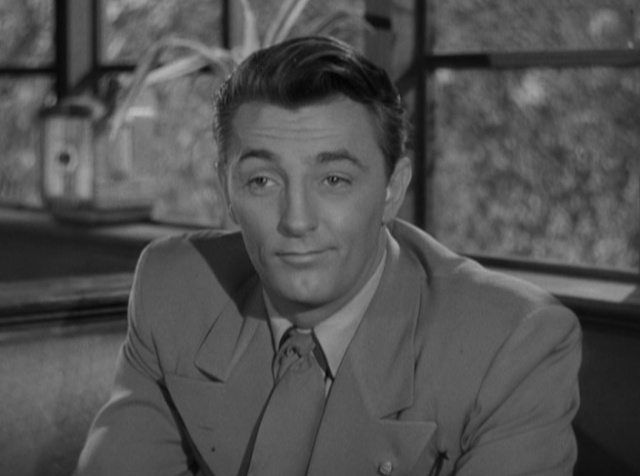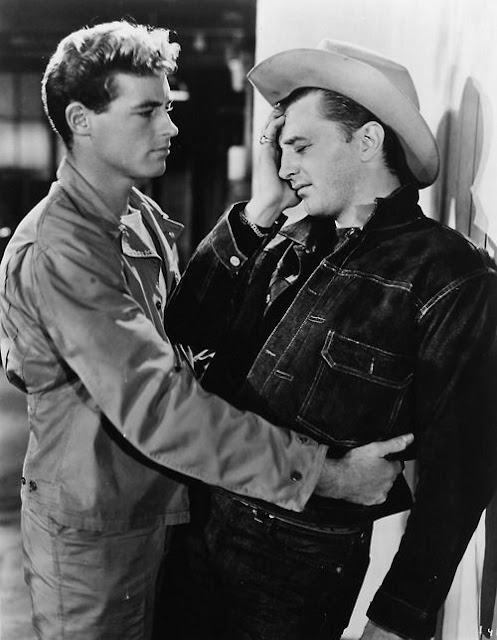Till the End of Time (1946) is an RKO melodrama exploring the difficulties of repatriation in post-WWII America. The film stars Guy Madison as Cliff Harper, a highly decorated marine who heads home after almost 4 years at war. His failure to launch into the next phase of his life has his pushy parents concerned. He falls for local war widow Pat Ruscomb (Dorothy McGuire) who is holding steadfast to the memory of her dead husband Johnny while seeking solace in the arms of Harper and other vets. The story also follows his two war buddies. First there's William Tabeshaw (Robert Mitchum), a smart-mouthed marine who is determined to gather up the funds to start his ranch but is hindered bu the physical affects of the silver plate in his head, a result of a war wound. Then there's Perry Kincheloe (Bill Williams), a former champion boxer who lost both his legs in the war and struggles to move forward with his life.
 |
| Guy Madison and Dorothy McGuire |
 |
| Bill Williams |
The physical and mental trauma of war and the adjustment to civilian life are themes at the heart of this story. Directed by Edward Dmytryk , Till the End of Time was based on the novel They Dream of Home by Niven Busch. Many changes were made to the original story by Allen Rivkin to adapt it to the screen. For example, Kincheloe was African-American and Tabeshaw was Native American. That's not to say race didn't factor into the movie. In the latter part of the film, a bigoted group of WWII vets called the American War Patriots try to recruit the film's trio of buddies into their organization. They accept "no Catholics, Jews or Negros" a proclamation that angers Harper, Tabeshaw and Kincheloe and leads to an epic bar fight which becomes the climax of the film.
 |
| Caleb Peterson |
Till the End of Time (1946) is a poor man's version of The Best Years of Our Lives (1946). The film was profitable for RKO but it suffers from a weak plot, poor character building and silly melodrama. The two principles played by Madison and McGuire proved to be a bland and uninteresting couple. I didn't care if they got together or they didn't. In fact I thought Madison's other love interest Helen Ingersoll, played by Jean Porter, was much more vivacious and interesting character and better suited to breathe some life into Harper. Porter met director Edward Dmytryk while making this film. He must have been captivated by her charm because the two married a couple of years later and stayed married until Dmytryk's death in 1999. Porter is the sole surviving cast member of the film at the time of this writing.
"I want to kiss you goodbye. But the room's too crowded." - Harper to Ruscomb
 |
| Dorothy McGuire |
 |
| Jean Porter |
I was particularly interested in how this film explored how WWII veterans suffered from the effects of the mental trauma of the war. There was one very engrossing scene with Richard Benedict. Harper and Ruscomb witness Benedict, credited as "the boy from Idaho", suffering from the shakes. It's clear he's going through some symptoms of PTSD. He doesn't want to go home because of the shame attached to "battle fatigue". It's a powerful scene and had there been more thought-provoking moments like that one it would have been a better movie as a result.
There are a lot of silly moments in this film. I thought it was hilarious that Madison's poor dancing skills were praised by the characters where as Jean Porter's real dancing skills were overlooked. And maybe it was the Howard Hughes touch but they did try to cram as much needless sexuality into this film. McGuire and Porter's characters are forward in their sexuality and punished for it. Heartthrob Guy Madison's good looks were over-utilized. Any time they could make an excuse to film him topless (in bed, on the beach, wherever) they took it.
 |
| Guy Madison, topless. Again. |
Till the End of Time wins a prize for what is probably the most homoerotic publicity photo of the era. This image of Madison and Mitchum together has always confused me. What's going on? Why is Madison holding Mitchum like that? I'm glad I watched the film to finally solve that mystery.
This may come off as biased because I'm such a big Robert Mitchum fan but he's really the best part about this movie, with the lovely Jean Porter battling him for the top spot. The film would have been vastly improved if it had focused on his character instead of Madison's Harper. Mitchum's swagger is charming. He's a tough guy with a heart of gold.
 |
| How could anyone resist Robert Mitchum's grin? |
Till the End of Time (1946) is available on DVD-MOD from the Warner Archive Collection.
Warner Archive Wednesday - On (random) Wednesdays, I review one title from the Warner Archive Collection. Thank you to the Warner Archive for sending me Till the End of Time (1946) for review!












